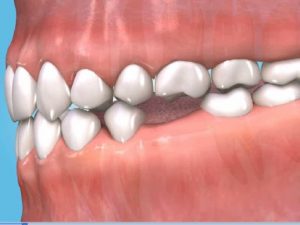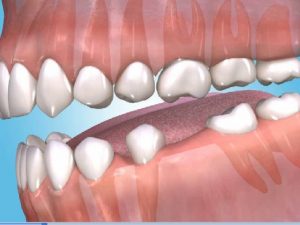Although we are committed to providing excellent preventive care and advice, it may sometimes be necessary to extract a tooth for the following reasons:
- Extensive decay or advanced gum disease
- A wisdom tooth has become impacted
- A baby tooth has failed to fall out and is preventing the emergence of a permanent tooth
- More room is needed for successful orthodontic treatment or to ensure new dentures fit properly
Benefits
- Can eliminate pain
- Prevents the spread of infection
- Creates extra space
Treatment steps
- We take an x-ray and assess your teeth to ascertain the best method of removal, which will either be a simple extraction or a surgical extraction.
- A simple extraction is performed on a tooth that is visible in the mouth. It involves loosening the tooth and removing it with dental forceps under local anaesthetic
- A surgical extraction involves making a small incision in the gum to remove a tooth that may have broken off or is concealed under the gum.
Aftercare
Immediately after your tooth has been taken out, try to keep the site clean by rinsing with warm, salty water. Encourage healing of the affected area by eating softer foods and chewing on the opposite side of your mouth. Also, try to avoid smoking or using a straw, as these can dislodge the clot that forms in the hole after extraction.
If you experience intense pain a few days after an extraction, you may have a condition known as dry socket, which occurs when a blood clot fails to form or is dislodged prematurely, exposing the bone. In this case, you will need to see the dentist who will help to rectify the problem and alleviate any pain.
I’ve had my tooth out – what should I do now?
Take it easy for the rest of the day. Take as little exercise as you can, and rest as much as you can. Keep your head up to avoid any bleeding
What precautions should I take?
Avoid hot food or drinks until the anaesthetic wears off. This is important as you cannot feel pain properly and may burn or scald your mouth. Also be careful not to chew your cheek. This is quite a common problem, which can happen when there is no feeling.
If you do rest, try to keep your head higher for the first night using an extra pillow if possible. It is also a good idea to use an old pillowcase, or put a towel on the pillow, in case you bleed a little.
Should I rinse my mouth out?
Do not be tempted to rinse the area for the first 24 hours. It is important to allow the socket to heal, and you must be careful not to damage the blood clot by eating on that side or letting your tongue disturb it. This can allow infection into the socket and affect healing.
Is there anything else I should avoid?
Avoid alcohol for at least 24 hours, as this can encourage bleeding and delay healing. Eat and drink lukewarm food as normal but avoid chewing on that area of your mouth.
When should I brush?
It is just as important, if not more so, to keep your mouth clean after an extraction. However, you do need to be careful around the extraction site.
What do I do if it bleeds?
 The first thing to remember is that there may be some slight bleeding for the first day or so. Many people are concerned about the amount of bleeding. This is due to the fact that a small amount of blood is mixed with a larger amount of saliva, which looks more dramatic than it is.
The first thing to remember is that there may be some slight bleeding for the first day or so. Many people are concerned about the amount of bleeding. This is due to the fact that a small amount of blood is mixed with a larger amount of saliva, which looks more dramatic than it is.
If you do notice bleeding, do not rinse out, but apply pressure to the socket. Bite firmly on a folded piece of clean cotton material such as a handkerchief for at least 15 minutes. Make sure this is placed directly over the extraction site and that the pad is replaced if necessary.
If the bleeding has not stopped after an hour or two, contact your dentist.
How soon can I have a cigarette?
It is important not to do anything which will increase your blood pressure, as this can lead to further bleeding. We recommend that you avoid smoking for as long as you can after an extraction, but this should be at least for the rest of the day.
Is there anything I can do to help my mouth?
Different people heal at different speeds after an extraction. It is important to keep your mouth and the extraction site as clean as possible, making sure that the socket is kept clear of all food and debris. Don’t rinse for the first 24 hours, and this will help your mouth to start healing. After this time use a salt-water mouthwash, which helps to heal the socket. A teaspoon of salt in a glass of warm water gently rinsed around the socket twice a day can help to clean and heal the area. Keep this up for at least a week or for as long as your dentist tells you.
It is important to keep to a healthy diet; and take a Vitamin C supplement, which will help your mouth to heal.
I am in pain, what should I take?
 There will usually be some tenderness in the area for the first few days, and in most cases some simple pain relief is enough to ease the discomfort. What you would normally take for a headache should be enough. However, always follow the manufacturer’s instructions and if in doubt check with your doctor first. Do not take aspirin, as this will make your mouth bleed.
There will usually be some tenderness in the area for the first few days, and in most cases some simple pain relief is enough to ease the discomfort. What you would normally take for a headache should be enough. However, always follow the manufacturer’s instructions and if in doubt check with your doctor first. Do not take aspirin, as this will make your mouth bleed.
Are there any medicines I should avoid?
As we have said, it is important not to use anything containing aspirin as this can cause further bleeding. This happens because aspirin can thin the blood slightly. Asthma sufferers should avoid Ibuprofen-based pain relief. Again check with your chemist or dentist if you are worried or feel you need something stronger
I am still in pain, what could it be?
Sometimes an infection can get in the socket, which can be very
painful. This is where there is little or no blood clot in the tooth socket and the bony socket walls are exposed and become infected. This is called a dry socket and in some cases is worse than the original toothache! In this case, it
is important to see your dentist, who may place a dressing in the
socket and prescribe a course of antibiotics to help relieve the infection. You may also feel the sharp edge of the socket with your tongue and sometimes small pieces of bone may work their way to the surface of the socket. This is perfectly normal.
Will my dentist need to see me again?
If it has been a particularly difficult extraction, the dentist will give you a follow-up appointment. This could be to remove any stitches that were needed, or simply to check the area is healing well.
Your dentist will also want to discuss the options available to you for replacing your lost tooth.
